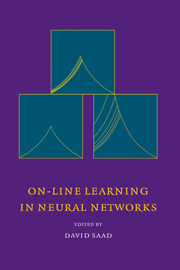Book contents
- Frontmatter
- Contents
- Acknowledgements
- List of contributors
- Foreword
- 1 Introduction
- 2 On-line Learning and Stochastic Approximations
- 3 Exact and Perturbation Solutions for the Ensemble Dynamics
- 4 A Statistical Study of On-line Learning
- 5 On-line Learning in Switching and Drifting Environments with Application to Blind Source Separation
- 6 Parameter Adaptation in Stochastic Optimization
- 7 Optimal On-line Learning in Multilayer Neural Networks
- 8 Universal Asymptotics in Committee Machines with Tree Architecture
- 9 Incorporating Curvature Information into On-line Learning
- 10 Annealed On-line Learning in Multilayer Neural Networks
- 11 On-line Learning of Prototypes and Principal Components
- 12 On-line Learning with Time-Correlated Examples
- 13 On-line Learning from Finite Training Sets
- 14 Dynamics of Supervised Learning with Restricted Training Sets
- 15 On-line Learning of a Decision Boundary with and without Queries
- 16 A Bayesian Approach to On-line Learning
- 17 Optimal Perceptron Learning: an On-line Bayesian Approach
2 - On-line Learning and Stochastic Approximations
Published online by Cambridge University Press: 28 January 2010
- Frontmatter
- Contents
- Acknowledgements
- List of contributors
- Foreword
- 1 Introduction
- 2 On-line Learning and Stochastic Approximations
- 3 Exact and Perturbation Solutions for the Ensemble Dynamics
- 4 A Statistical Study of On-line Learning
- 5 On-line Learning in Switching and Drifting Environments with Application to Blind Source Separation
- 6 Parameter Adaptation in Stochastic Optimization
- 7 Optimal On-line Learning in Multilayer Neural Networks
- 8 Universal Asymptotics in Committee Machines with Tree Architecture
- 9 Incorporating Curvature Information into On-line Learning
- 10 Annealed On-line Learning in Multilayer Neural Networks
- 11 On-line Learning of Prototypes and Principal Components
- 12 On-line Learning with Time-Correlated Examples
- 13 On-line Learning from Finite Training Sets
- 14 Dynamics of Supervised Learning with Restricted Training Sets
- 15 On-line Learning of a Decision Boundary with and without Queries
- 16 A Bayesian Approach to On-line Learning
- 17 Optimal Perceptron Learning: an On-line Bayesian Approach
Summary
Abstract
The convergence of online learning algorithms is analyzed using the tools of the stochastic approximation theory, and proved under very weak conditions. A general framework for online learning algorithms is first presented. This framework encompasses the most common online learning algorithms in use today, as illustrated by several examples. The stochastic approximation theory then provides general results describing the convergence of all these learning algorithms at once.
Introduction
Almost all of the early work on Learning Systems focused on online algorithms (Hebb, 1949; Rosenblatt, 1957; Widrow and Hoff, 1960; Amari, 1967; Kohonen, 1982). In these early days, the algorithmic simplicity of online algorithms was a requirement. This is still the case when it comes to handling large, real-life training sets (LeCun et al., 1989; Müller, Gunzinger and Guggenbühl, 1995).
The early Recursive Adaptive Algorithms were introduced during the same years (Robbins and Monro, 1951) and very often by the same people (Widrow and Stearns, 1985). First developed in the engineering world, recursive adaptation algorithms have turned into a mathematical discipline, namely Stochastic Approximations (Kushner and Clark, 1978; Ljung and Söderström, 1983; Benveniste, Metivier and Priouret, 1990).
Although both domains have enjoyed the spotlights of scientific fashion at different times and for different reasons, they essentially describe the same elementary ideas. Many authors of course have stressed this less-than-fortuitous similarity between learning algorithms and recursive adaptation algorithms (Mendel and Fu, 1970; Tsypkin, 1971).
The present work builds upon this similarity. Online learning algorithms are analyzed using the stochastic approximation tools. Convergence is characterized under very weak conditions: the expected risk must be reasonably well behaved and the learning rates must decrease appropriately.
- Type
- Chapter
- Information
- On-Line Learning in Neural Networks , pp. 9 - 42Publisher: Cambridge University PressPrint publication year: 1999
- 137
- Cited by

